I-MRSEC’s Virtual REU Undergrads Gain Knowledge, Skills, and Insights into Their Future Careers
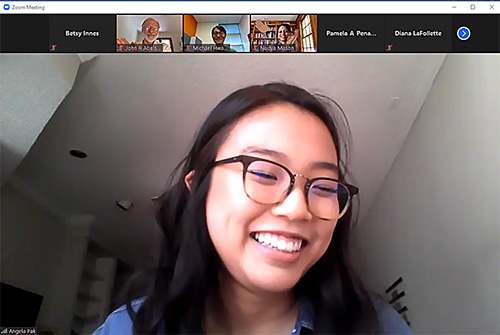
I-MRSEC REU undergrad Angela Pak answers questions about her research during the I-MRSEC REU Research Symposium on July 29th.
August 7, 2020
Although the COVID-19 pandemic precluded I-MRSEC (the Illinois Materials Research Science and Engineering Center) from hosting the residential REU (Research Experience for Undergraduates) intended for summer 2020–—undergraduate students physically conducting research in Illinois labs—the eleven undergrads from all across the U.S. who participated appeared to have benefitted immensely. What kind of impact did participating in the I-MRSEC REU’s virtual counterpart have on the undergrads? In addition to conducting cutting-edge research in one of Illinois’ labs—virtually—mentored by an I-MRSEC faculty member and/or a Ph.D or post-doc researcher, they presented their results at I-MRSEC's Undergraduate Symposium. Plus, students also gained other benefits from the REU: some became adept at using new software; others gained confidence; still others gained a clearer understanding of the direction they plan to go careerwise—including materials science research—all thanks to I-MRSEC’s Virtual REU.
After collecting and analyzing data related to their individual projects, the participants got to experience presenting the results of their research during the two sessions of the I-MRSEC REU Research Symposium held on July 29th and 30th, giving students the chance to share what they'd learned, demonstrate new skills they’d acquired, and answer audience questions.These final presentations took place via Zoom, similar to the bulk of their interactions as part of the NSF-funded REU.
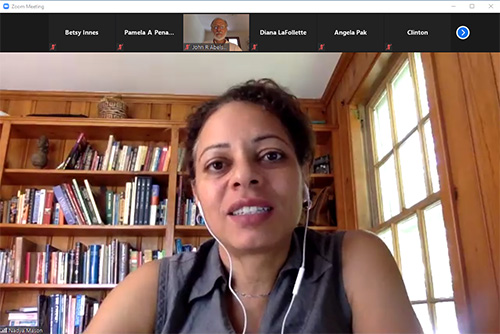
Via Zoom, I-MRSEC PI Nadya Mason interacts with undergrads presenting during the I-MRSEC REU Research Symposium on July 29th..
Regarding I-MRSEC leadership’s decision to continue the previously planned residential REU virtually, PI Nadya Mason says they did it for the students. “Despite our disappointment at having to cancel the in-person program,” she admits, “we quickly realized that students now, more than ever, wanted and needed the REU experience.” She claims that holding the virutal REU was especially important for the rising seniors. “The research experience and professional development would likely be crucial to their decisions about graduate school and professional choices next year,” she continues. “So, we decided to go ahead with the program, confident that we could rise to the challenge of putting together a strong virtual program for students.”
Mason admits that they put a great deal of effort into trying to compensate for the lack of in-person, face-to-face interaction “A lot of the in-person learning happens informally,” she admits, “through hallway conversations, watching over shoulders, etc. So we had to think of ways of re-creating that experience virtually—which in this case involved more personal and group virtual meetings.” Indicating that she was sad that the REU students couldn’t experience I-MRSEC’s fun and collaborative research environment in person, she adds, “Though I hope they got at least a taste of that in their virtual experience.”

QuoVadis Renae’ Savoy, a rising senior at Southern University A&M at Baton Rouge, Louisiana. An Electrical Engineering major minoring in mathematics, Savoy was funded through NanoMFG and mentored by Elif Ertekin on a research project called Gr-ResQ (“Graphene Rescue”).
Mason, who mentored one of the REU participants, further explains that for her research group, the virtual requirement was particularly difficult. “Finally, my group typically does experimental research, so we had to come up with an all-virtual project. I was fortunate to have a visiting professor working with me who figured out a great project related to our research.”
According to Mason, all of the REU students she spoke with said they had had a great experience and were extremely grateful that they could participate. “I think the students got a real taste of research and of being in a research environment, even virtually, which will help train them and inform their choices about their future careers,” she explains, adding: “I also think they were happy to have some ‘normalcy’ during an otherwise abnormal summer.”
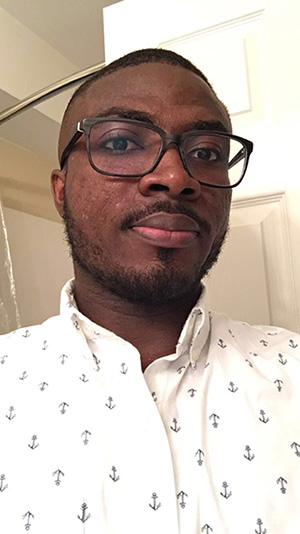
Jeffrey Ausbonteng.
Agreeing with Mason's appraisal of their experience, several of the undergrads discuss their research, their results, and some of the things they gained through the REU.
For instance, Jeffrey Ausbonteng will be a rising senior this fall at North Carolina Central University in Durham, NC, majoring in mathematics and biology. His research this past summer focused on using a neural network to generate a mathematical model with 99% validation accuracy in order to develop a face mask analytic tool.
According to Ausbonteng, the most challenging part of his research was “getting used to GitHub, which is something new that I have learned. This program has improved my understanding of developing mathematical models using python and some other software.” Regarding this summer’s impact on his career plans for the future, Ausbonteng acknowledges, “This experience has cemented what I have planned to do in the future.”
Olivia Gordon will be a rising junior this fall at Grand Valley State University in Allendale, Michigan. She is majoring in chemistry and minoring in environmental and sustainability studies. Gordon reports that her research this summer in Elif Ertekin's lab resulted in a nearly fully automated system written in Python to analyze Stone-wales-type bond rotation energy barriers in graphene.
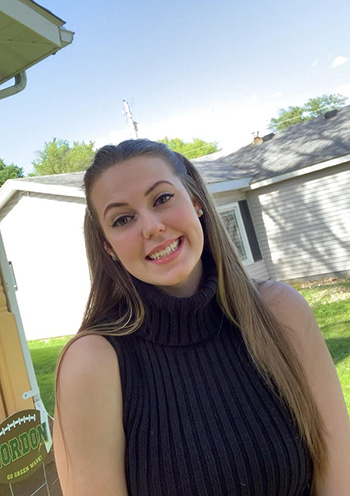
Olivia Gordon.
Gordon reports that the most challenging thing for her was “going from absolutely zero knowledge about coding and writing in Python, to being able to write fully functional scripts 100s of lines long. For me it was an impressive jump and something I didn't think was possible in 10 weeks. Certainly it was a challenging experience, with lots and lots of trial and error, but a rewarding one nonetheless.”
Gordon indicates that one way she grew personally this summer was learning to collaborate with others and to appreciate the benefits of interdisciplinary collaboration.
“Prior to the summer,” she reports, “I had never worked with other students on a research project—never mind it being interdisciplinary. This taught me to be more collaborative and to keep an open mind about how someone else with a completely different background would approach the same problem. As a student, this experience impacted the ways in which I am able to analyze and approach a problem. It has opened my eyes to embracing more interdisciplinary collaborative work in the future.”
Gordon indicates that the experience this summer has significantly influenced her future career plans and goals.
“I had never really given much thought to graduate school or doctorate programs,” she admits, “but all the presentations and resources given to me through this program have really pushed me to realize I want more out of my education.”
.jpg)
Diana LaFollette.
Admitting that she always knew she wanted to continue to do research, she adds, “but I never realized that in order to accomplish that I should continue and go for my own PhD. I've proudly decided that is what I want to do thanks to the I-MRSEC this summer.”
Another I-MRSEC REU undergrad was Diana LaFollette, a rising senior at the University of Southern California who is majoring in chemical engineering with a focus on sustainable energy and a minor in environmental studies. Working with Dr. John Abelson this summer in the area of model simulations of thin film nucleation, LaFollette created a model that she says will predict the physical morphology of a thin film based on certain growth parameters, specifically the nucleation rate and the growth rate.
According to LaFollette, the most challenging parts of her experience were learning Python and adapting to a virtual environment. “When you're working from home,” she admits, “you don't have anyone you can turn to to talk through your ideas with someone right next to you.” Conversely, she adds that “The challenge of working virtually definitely made me more confident in working independently and figuring out solutions to problems without assistance.”
LaFollette acknowledges that prior to this summer, she knew very little about thin films or Python. “After developing this model,” she asserts, “I feel I have a much better grasp on thin films as a whole, computer modeling techniques, and Python as a programming language.”
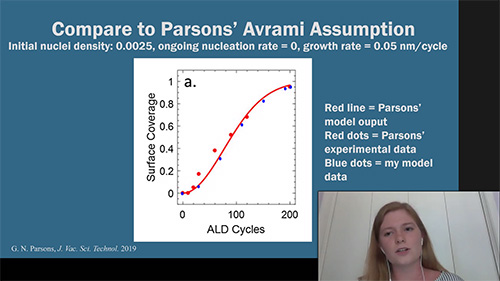
Diana LaFollette presents her research results during the I-MRSEC REU Research Symposium.
Regarding the impact that participating in I-MRSEC REU has had on her personally and as a student, LaFollette reports that the experience made her much more confident in both her research abilities and her abilities as a programmer. “Previously,” she admits, “I did not view coding as one of my strengths, but over the summer, I grew a lot in that area.” In addition, her previous research experiences had all involved a lot of hands-on supervision from graduate students, but as a result of this summer, she claims:
“The virtual environment made my project much more independent, which made me feel much more prepared for going into graduate school where I'd be doing research independently.”
Did the experience impact her career plans? She acknowledges that before this summer, she was planning on going to graduate school and eventually becoming a professor. This summer definitely confirmed her intended career path and that she still wants to pursue a role in academia.
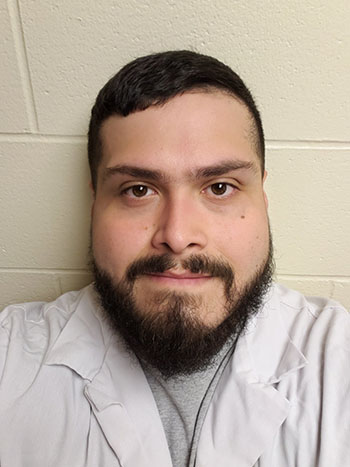
Isiah Ramos. (Image courtesy of Isiah Ramos.)
Isiah Ramos is a rising junior who’s transferring from Parkland Community College to Illinois in fall 2020; he intends to major in Agricultural and Biological Engineering (ABE) with a focus on nanotechnology. Ramos, who worked with I-MRSEC Prof. Narayana Aluru on a project that involved active interfaces between highly deformable nanomaterials, reports that because he did a literature review, he didn’t really have any results. However, he does insist, “Biosensors are neat though!”
Regarding the most challenging part of his experience, Ramos admits, “Easily the fact that everything was online. There are certain things that are better explained in person.”
What were some of the positive impacts of his experience? Ramos admits that prior to the summer, he “knew next to nothing about 2D graphene and its applications, I guess you could say it was something I took for granted before knowing how much it can do.”
Not only that, but he acknowledges that the summer had an even bigger impact on his future career plans. “I started the summer curious about materials research,” he says, “and I'm ending it knowing full well that I want to go into biomaterials research for grad school, with U of I being at the top of that list of schools.”
Further, he also figured out what he wants do career-wise. “I intend to go into research as my career much further down the road. This program just helped me narrow down the options; I'm interested in various fields of research, and the MRSEC combines all of those aspects into one. Going into biomaterial research just seems like a no brainer at this point.”
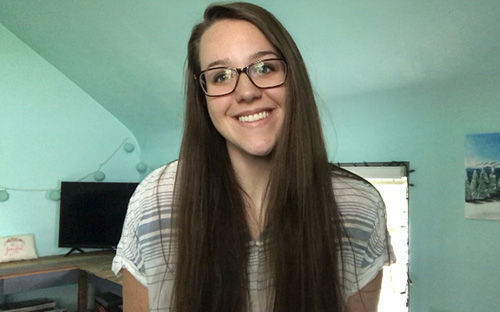
Kaitlyn Wiegand presenting her research via Zoom. (Image courtesy of Kaitlyn Wiegand.)
Kaitlyn Wiegand, a rising senior in Chemistry at Southern Illinois University-Carbondale, spent the summer in Professor Nadya Mason’s group researching micro magnetics simulations. Regarding her results, she reports that coupled magnetic islands at very close distances were found to have significantly smaller switching fields than isolated nano-spheres and nano-discs—similar to the results of the literature proposal she modeled her simulations after.
According to Wiegand, the most challenging thing about her research experience was trying to accomplish all of the goals in a 10-week period. “As the research progressed,” she admits, “we were always learning and figuring out new ways to simulate each system.”
Wiegand reports that she learned a great deal this summer, including information about graduate school at Illinois, the research process, and specific science related to her research. She claims that “One major thing that I learned was how to use OOMMF, a micromagnetics simulation software.”
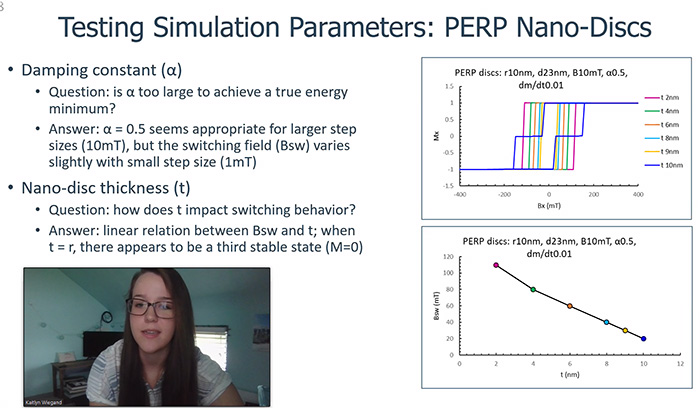
Kaitlyn Wiegand presenting her research via Zoom. (Image courtesy of Kaitlyn Wiegand.)
How did the research experience impact her personally and as a student?
“This experience has taught me to have confidence in my ideas and results,” she asserts, “and to always be actively thinking of how a certain problem could be carefully and systematically studied. It has also taught me to accept results which don't necessarily fit my expectations, as a beneficial and crucial step in the research process.”
Regarding the impact her experience might have on her future career, she says, “This experience provided me with a lot of motivation and helpful skills to use moving forward in my academic career as I apply to graduate school, especially when it comes to the type of research I am interested in. I-MRSEC faculty really put an emphasis on the idea of pursuing what you enjoy, which changed my outlook in a very positive way.”
Story by Elizabeth Innes, Communications Specialist, I-STEM Education Insitiative. Photos by Elizabeth Innes, unless otherwise noted.
For additional articles about the I-MRSEC REU, please see:
- I-MRSEC’s Virtual REU to Expose Undergrads to Research, Provide Training in Needed Skills
- I-MRSEC REU Exposes Undergrads to Materials Science, Research, and What Grad School Is Like
- I-MRSEC REU Teaches Carmen Paquette a Lot About Magnetism, Research, and Herself
More: Externally Funded, I-MRSEC, MatSE, Physics, I-MRSEC REU, Science Centers, 2020
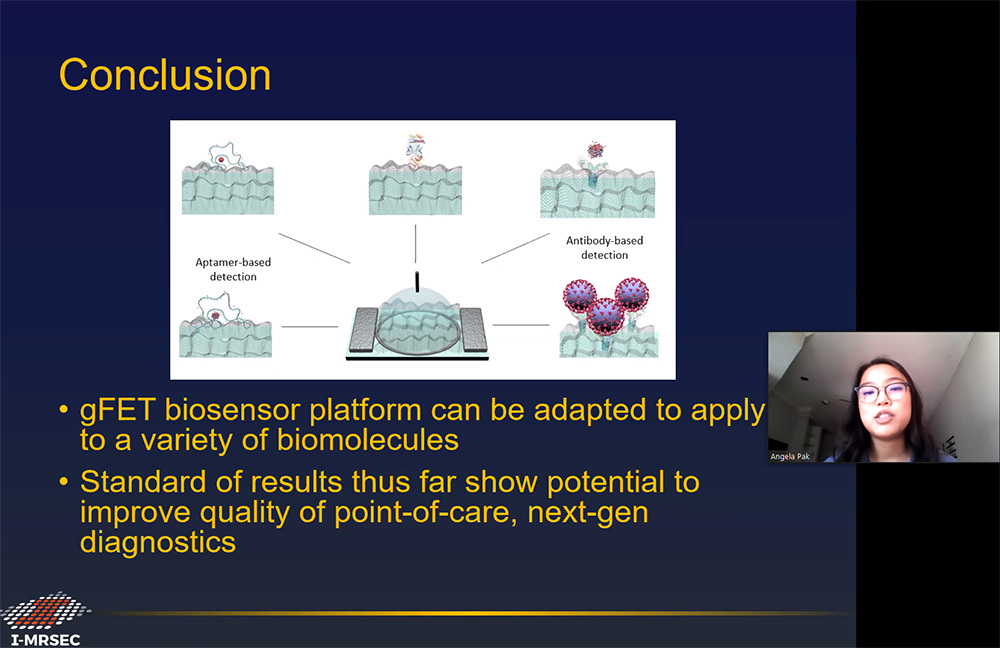
I-MRSEC REU undergrad Angela Pak shares her conclusions during her final presentation during the first session of the I-MRSEC REU Research Symposium on July 29th.













.jpg)
















